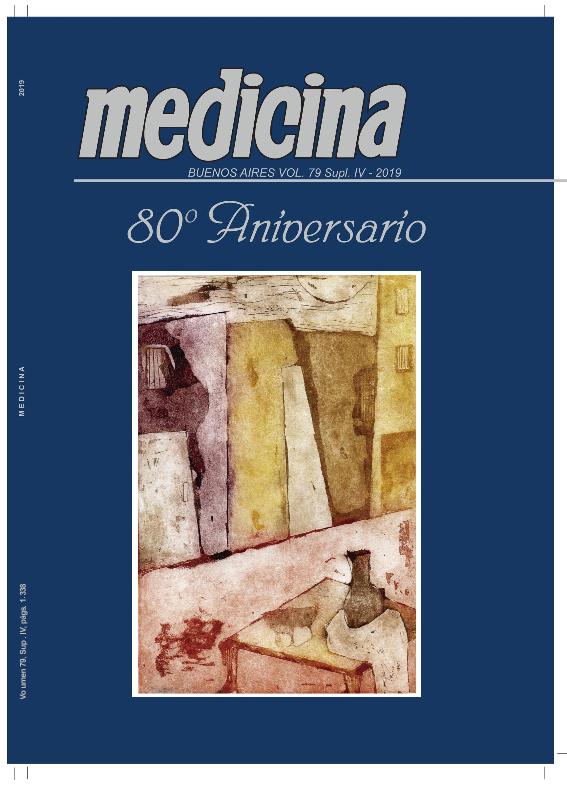Evento
Hyperthyroidism enhances fetal and placental growth and placental immune cell infiltration
Sánchez, María Belén ; Moreno Sosa, María Tamara
; Moreno Sosa, María Tamara ; Niera, Flavia Judith; Pietrobon, Elisa Olivia
; Niera, Flavia Judith; Pietrobon, Elisa Olivia ; Soaje, Marta
; Soaje, Marta ; Valdez, Susana Ruth
; Valdez, Susana Ruth ; Jahn, Graciela Alma
; Jahn, Graciela Alma ; Mackern Oberti, Juan Pablo
; Mackern Oberti, Juan Pablo
 ; Moreno Sosa, María Tamara
; Moreno Sosa, María Tamara ; Niera, Flavia Judith; Pietrobon, Elisa Olivia
; Niera, Flavia Judith; Pietrobon, Elisa Olivia ; Soaje, Marta
; Soaje, Marta ; Valdez, Susana Ruth
; Valdez, Susana Ruth ; Jahn, Graciela Alma
; Jahn, Graciela Alma ; Mackern Oberti, Juan Pablo
; Mackern Oberti, Juan Pablo
Colaboradores:
Costas, Mónica; Merino, Gabriela; Azurmendi, Pablo Javier

Tipo del evento:
Reunión
Nombre del evento:
LXIV Reunión Anual de la Sociedad Argentina de Investigación Clínica; LI Reunión Anual de la Asociación Argentina de Farmacología Experimental; XXI Reunión Anual de la Sociedad Argentina de Biología; XXXI Reunión Anual de la Sociedad Argentina de Protozoología; IX Reunión Anual de la Asociación Argentina de Nanomedicinas; VI Reunión Científica Regional de la Asociación Argentina de Ciencia y Tecnología de Animales de Laboratorio
Fecha del evento:
13/11/2019
Institución Organizadora:
Sociedad Argentina de Investigación Clínica;
Asociación Argentina de Farmacología Experimental;
Sociedad Argentina de Biología;
Sociedad Argentina de Protozoología;
Asociación Argentina de Nanomedicinas;
Asociación Argentina de Ciencia y Tecnología de Animales de Laboratorio;
Título de la revista:
Medicina (Buenos Aires)
Editorial:
Fundación Revista Medicina
ISSN:
0025-7680
Idioma:
Inglés
Clasificación temática:
Resumen
Thyroid dysfunctions cause reproductive disorders as fetal deaths, preterm birth and preeclampsia. Whether thyroid hormones (THs) exert any function in placental immune cells is unknown. Therefore, the aim of our work was to assess the influence of hyperthyroidism on placental immune cells as well as the impact on reproduction in pregnant rats. To this end, 10-12 weeks old Wistar rats were injected with a daily dose of T4 (0.1 or 0.25 mg/kg s.c) to induce hyperthyroidism (hyper) or vehicle in control animals. Rats were mated 8 days after starting T4 treatment and euthanized on day 19 (G19) and 20 (G20) of gestation. Placenta samples were minced to reach single cell suspension. Then, resident placental immune cells (CD45+) were analyzed by flow cytometry and mRNA content of hormone receptors by qPCR. Also, placental and fetus weights and fetus number were measured. Hyper mothers delivered more fetuses compared to controls (p<0.001). The offspring of hyper 0.25 mg/kg mothers weighed more in G19 and G20 (p<0.001). The placentas of the hyper 0.25 mg/kg mothers were heavier than controls only in G19 (p<0.001). Furthermore, we showed a decrease in the expression of progesterone, estrogen and ß2 thyroid receptors in hyper 0.1 mg/kg (p<0.05; p<0.01). On G19, the percentage of leukocytes was significantly higher in both hyper groups (p<0.05 for 0.1 mg/kg; p<0.01 for 0.25 mg/kg). On G20 we showed an increase in leukocyte infiltrate respect to G19 in the control (p<0.001) but not in the hyper group. These results suggest that T4 administration accelerates fetal development and changes the placental sensitivity to ovarian steroids by modulating their receptors expression and advances the increase in placental resident leukocytes. To our knowledge, this is the first report that shows the modulation of resident immune cells by thyroid hormones.
Archivos asociados
Licencia
Identificadores
Colecciones
Eventos(IMBECU)
Eventos de INST. DE MEDICINA Y BIO. EXP. DE CUYO
Eventos de INST. DE MEDICINA Y BIO. EXP. DE CUYO
Citación
Hyperthyroidism enhances fetal and placental growth and placental immune cell infiltration; LXIV Reunión Anual de la Sociedad Argentina de Investigación Clínica; LI Reunión Anual de la Asociación Argentina de Farmacología Experimental; XXI Reunión Anual de la Sociedad Argentina de Biología; XXXI Reunión Anual de la Sociedad Argentina de Protozoología; IX Reunión Anual de la Asociación Argentina de Nanomedicinas; VI Reunión Científica Regional de la Asociación Argentina de Ciencia y Tecnología de Animales de Laboratorio; Mar del Plata; Argentina; 2019; 214-214
Compartir



